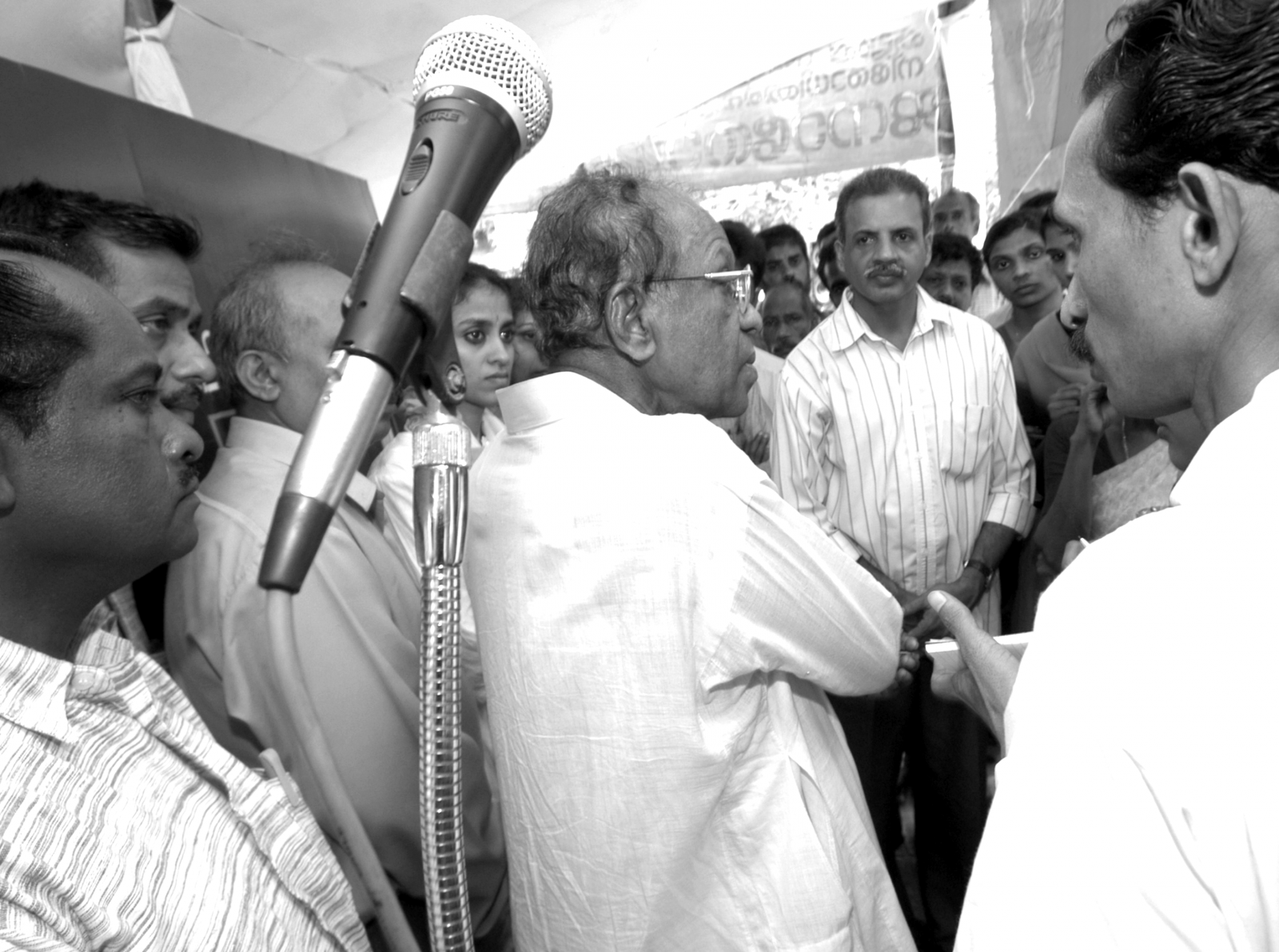
Dr. Sukumar Azhikkode addresses satyagrahis, abandoning mike, in protest against police restriction on mike usage Courtesy: Jayakrishnan CK, Mathrubhumi
In Kerala the night time ban on loudspeakers is seen as an attempt to silence the masses
Cultural Kerala has risen in protest against the July 18 verdict of the Supreme Court banning the use of loudspeakers in residential areas from 10 p.m. to 6 a.m. except in case of "public emergency".
Jurist VR Krishna Iyer has vehemently decried the general nature of the verdict. "Pleasurable sounds with aesthetic orientation" like music and related artistic activities should not be stifled. Remarkably prescient, he pointed out the distinct danger of the misuse of this provision by authorities, especially the police. "Never should constabulary control, often vulnerable to corruption, be entrusted with police power."
This insight is relevant in the context of a recent incident. Dr. Sukumar Azhikkode, well known as the social conscience of Kerala, forsook the mike in protest against a police order restricting permission to half an hour. This happened on September 13, when he inaugurated the satyagraha against the ban on common salt organised by Jana Arogya Prasthanam (JAP, People’s Health Movement) outside the district medical officer’s office in Kochi. The police justified the restriction on the grounds that the venue was a public place. The licence mentioned that the decision was based on a government notification. "I have never been so humiliated in my life. Freedom of expression is guaranteed by our Constitution," said Dr. Azhikkode. Chairman of JAP, Dr. Jacob Vadakkanchery has resolved to challenge the verdict both by flouting the ban as well as contesting it legally with the support of eminent political and social activists.
The Performing Artists Coordination Kerala (PACK), an apex body of aggrieved artists with veteran stage personality Ahwan Sebastian as general convenor, has already filed a review petition in the Kerala high court. According to PK Sunil Kumar, state secretary of the Musicians Welfare Association, one-and-a-half lakh families of instrument players and singers would be affected. In all, three lakh families of performing artists would be robbed of their livelihood. This sentiment is echoed by KJ Thomas, joint secretary of Bankment’s Club, Kozhikode, a premier organisation with a vibrant cultural calendar, who also fears dubious intent to promote only religious functions, further fuelling religiosity. His opinion is shared by VS Anilkumar, progressive writer and academician, who also sees in it a conspiracy to broaden spaces of silence in society, which will facilitate the unchallenged implementation of the globalisation agenda of neo-liberal polity. He also equates this with the deliberate American killing of an Al-Jazeera journalist in Iraq, thus silencing uncomfortable voices of protest.
Doyen of Malayalam theatre, KT Mohammed views it as an assault on the free exercise of the beauty and strength of sound, which is an inalienable right of the people. Sara Joseph, Kendra Sahitya Academy award winner and social activist, is of the opinion that the plight of the five lakh odd families who would be affected by the ban, should be addressed. While political and religious functions can be thus restricted, artistic expression should be exempted. "In the present dispensation the tendency seems to be to curb all essential rights enjoyed by the masses, whether it is the right to strike or the right to organise peaceful demonstrations. The present curb on the use of loudspeakers is yet another glaring example of this wanton attempt," says Dr. TK Ramachandran, cultural critic and coordinator of Secular Collective, Kozhikode.
Another stark human face of the ban is highlighted by PK Assainar, Malappuram district president of the Sound Service Association, who reveals that more than two lakh people directly and indirectly employed by this sector would be affected. Already the ban on advertising announcements by commercial establishments has rendered people jobless. Lottery ticket-sellers are permitted on the grounds that they operate at the low decibel level of hand-held megaphones. Increasingly, people from the light and sound field are now hiring themselves out to mobile displays of commercial establishments in pick-up vans, which according to him, and in flagrant violation of the law, are not even insured. The night cap on loudspeakers will adversely affect their prospects, as most of the religious functions and fairs are late night or even all night celebrations.
The consensus thus seems to be that this ban would lead to throttling society, since it prevents the vigorous and continued articulation of dissent, which is the cornerstone of democracy.
Archived from Communalism Combat,October 2005 Year 12 No.111, Cover Story 2